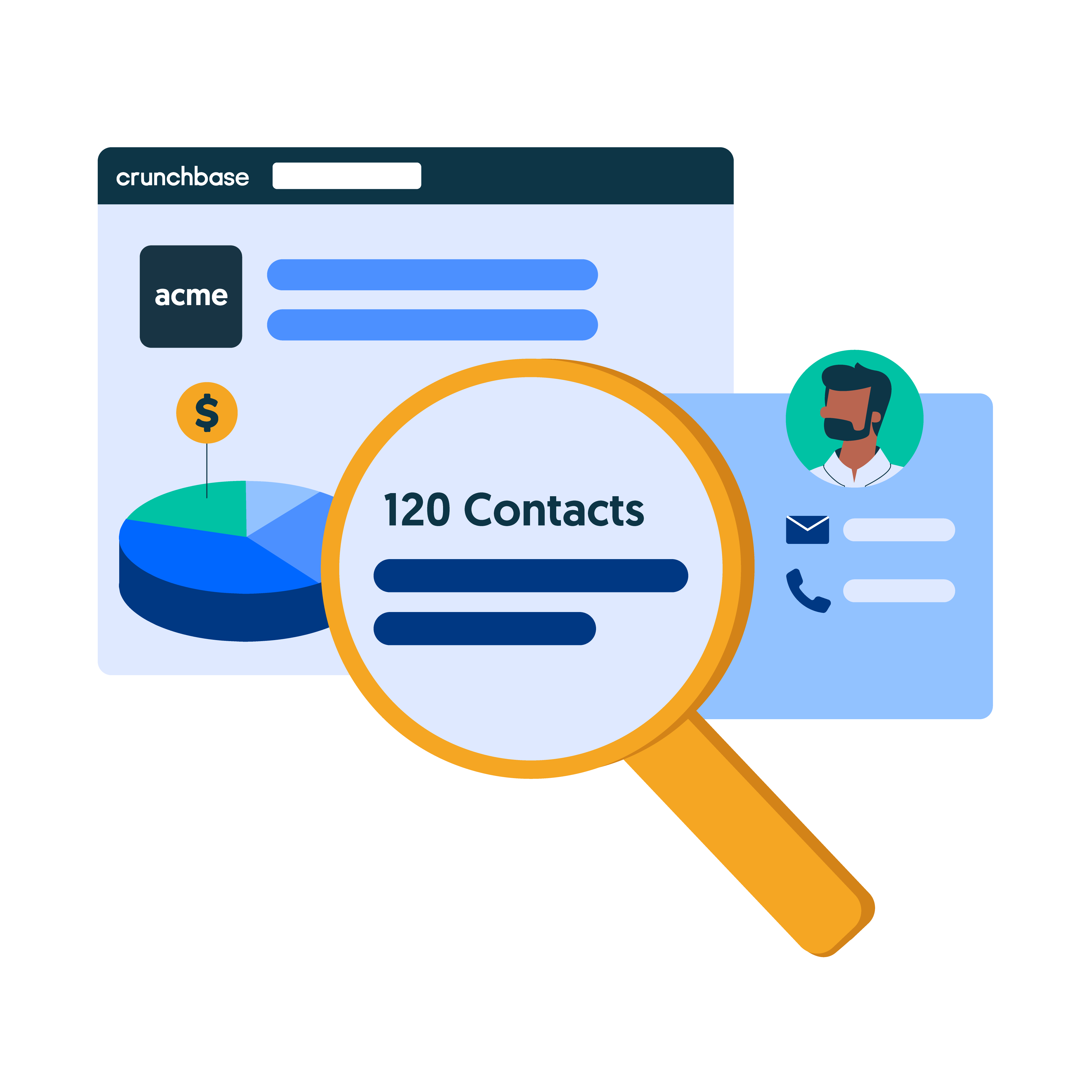There’s no shortage of paid and free sales prospecting tools on the market these days, all touting time-saving features. But who of today’s busy sales professionals has the time to vet hundreds of lead generation and sales prospecting tools, let alone road test them to find the best fit?
Although no number of lead prospecting tools can replace the value of the personal touch of relationship building, taking advantage of modern sales prospecting software is an effective way to generate more revenue in less time.
Search less. Close more.
Grow your revenue with all-in-one prospecting solutions powered by the leader in private-company data.
In this article, you’ll learn:
- What sales prospecting is
- The difference between a lead and a prospect
- The benefits of using the best sales prospecting tools
- Quick tips for successful sales prospecting
- 20 of the best sales prospecting tools for 2023
What is sales prospecting?
Sales prospecting is the process a sales team goes through to find and connect with potential customers. The ultimate goal of prospecting is generating revenue by finding the right buyers.
Prospecting is arguably one of the most crucial steps in a company’s sales strategy because it’s responsible for building a sales pipeline and filling prospecting databases with ready buyers–the key to generating revenue.
However, sales prospecting is not a single process. Instead, it’s a collection of steps covering every aspect of customer acquisition, from contacting a lead to converting them into a buyer. One of the more crucial areas of prospecting is nurturing leads. Here, sales reps must uncover a prospect’s needs and show them how their product or service can address their pain points.
It’s also crucial for a sales rep to be smart about their prospecting. That means pre-screening and researching leads to make sure they can truly benefit from their product or solution. This guarantees sales reps make the most efficient use of their time by only engaging with people with the highest propensity to convert.
Because of the broad scope of prospecting, it requires varying sales and marketing techniques. Traditional prospecting tactics include cold calling, cold emailing, or even buying prospect lists from third-party providers. But these “spray and pray” methods are outdated, and aren’t paying off like they used to—prospects now expect every interaction to be personalized.
In fact, emails with personalized subject lines are 26 percent more likely to be opened. So, how do you find the information you need to personalize your outreach without spending hours researching each lead? By leveraging the right prospecting websites and tools, sales teams can streamline the prospecting process with access to relevant prospect data and helpful insights that can help them cut through the noise with relevant, timely outreach.
What’s the difference between a lead and a prospect?
Before we dive into the prospecting tools available to you, let’s first discuss a common misconception. Many people use the terms “lead” and “prospect” interchangeably. But in reality, they’re two very distinct things.
A lead is any person who’s interested in your offer, regardless if they’re the right fit or not. A good example is a potential homebuyer who expresses interest in your property but can’t afford it. This would be considered an unqualified lead.
A prospect, on the other hand, is a person that would benefit immensely from your product or service. So in the example we use above, a prospect would be a homebuyer who can not only afford your property, but is also a great fit because they have children who will love the huge backyard. Prospects are often the result of outbound campaigns, or the qualification of inbound leads from your marketing campaigns.
While leads and prospects are different, they’re essential parts of your sales funnel. Both can result in new customers if nurtured the right way. Now, let’s dive into how using the best sales prospecting tools can help you generate, nurture and convert leads into prospects and customers.
The benefits of using the right sales prospecting tools
While taking a personalized, human approach to sales is the best way to close deals, automating your sales workflow with the right sales prospecting tools can help your team scale your efforts. The prospecting process is one of the most time-consuming and frustrating stages in the sales cycle–finding the right solution for your team can help increase efficiency and enable you to become even more effective.
Here are a few of the benefits of using the right sales prospecting tools:
- Save time
One common problem with reps is that they don’t spend much time on the sales tasks that actually close deals—like engaging with people or closing deals. Instead, they’re often bogged down with administrative tasks like writing sales email templates, creating a prospect list, or editing a contract. A side effect of this is that they automate the “human” aspect of selling, leading to stiff sales calls that feel robotic and automated.
Sales prospecting tools can help lighten the load of some of these repetitive tasks. For instance, software can be used to search and manage a prospect list. Many great prospecting apps and tools are available to help you navigate. With more free time, sales reps can focus on adding a personal touch to their engagements. As a result, they can close more high-quality deals in a shorter period.
Search less. Close more.
Grow your revenue with all-in-one prospecting solutions powered by the leader in private-company data.
- Uncover more qualified leads
Traditionally, sales reps needed to cold call a massive list of leads to find the few with the intent and capacity to buy. Unfortunately, this only wastes time and annoys customers. Fortunately, modern sales prospecting tools can help sales reps rate a prospect’s “fit” for their offer. In addition, these platforms give sales reps more customer data at their fingertips. They can then use this information to uncover a prospect’s intent before they engage with them one-on-one. With powerful, full-feature online sales tools, they won’t waste time on prospects that are a poor fit.
- Improve customer service
When your company integrates the right sales prospecting tools into its workflow, it can help create a focused sales plan, reducing customer friction down the line.
Good sales prospecting software can integrate with other tools in your company’s pipeline, such as customer relationship management (CRM) and email platforms. Doing this allows you to quickly transition prospects to paying customers. You can seamlessly onboard them, send welcome emails, and potentially follow up with more marketing messages in the future.
When your company integrates the top sales prospecting tools into its workflow, it offers you the opportunity to create a customer-focused plan that minimizes the risk of unqualified prospects slipping into your client database. You eliminate potential friction and improve the sales experience when quality customers are your focus. If they encounter issues down the line, your support team can easily tackle them because that customer’s data is readily available.
Quick tips for successful sales prospecting
- Get to know your buyers
The key to success with sales prospecting is knowing your customers inside and out. This starts with creating and internalizing a buyer persona or ideal customer profile (ICP). A buyer persona represents your ideal customer—their industry, company size, pain points, budget and goals. Knowing this information allows sales reps to spot leads that closely match a persona instantly.
In addition, studying your persona can also help you craft marketing messages that your leads will better respond to. This leads to a higher chance of conversion. Unfortunately, not many salespeople spend the necessary amount of time to research their prospects first. Instead, they rely on the “spray and pray” method, which simply wastes time and is highly inefficient.
- Work only on the most qualified leads
A critical tactic for increasing your sales revenue is to only focus on the most qualified leads. These people have the best chances of converting to buyers, which is a better use of your time. This is where sales prospecting tools can help immensely. You can use buy signals and intent data to rank leads according to their readiness to buy, boosting sales numbers over time.
- Make it personal
It’s human nature to want to feel special. You can elicit this emotion from leads by personalizing your engagement. Through this personal engagement, you’re targeting potential customers’ subconscious decision-making, which accounts for 95% of buying behavior. So, next time you’re reaching out via email or conducting social prospecting on LinkedIn, customize your message to ensure leads and prospects know it is meant just for them instead of using a script.
Remember, people always buy with emotion first and then justify it with logic. So if you talk with your leads on a human level, it will help build trust.
- Invest in your prospecting skills
Prospecting is just like any other skill—it can be developed. So the best thing you can do as a sales rep is to enhance this skill. The quickest way is to find a master salesperson to coach you. You can also invest in paid courses or books.
You should also focus on creating a prospecting system. The best sales prospectors have a reliable and repeatable process that they can execute every day to generate a steady supply of qualified leads. The good news is software can help you create this system, especially if you invest in an all-in-one solution that enables you to go from research to outreach in one platform.
Search less. Close more.
Grow your revenue with all-in-one prospecting solutions powered by the leader in private-company data.
20 must-have sales prospecting tools for 2023
Here are 20 sales prospecting tools that can streamline your sales prospecting and help accelerate your growth in 2023.
*The following companies are not listed in any particular order and do not represent all sales prospecting tools available.
1. Crunchbase
- Total funding: $56.5 million
- Founded date: 2007
- Lead investors include: OMERS Ventures, Mayfield Fund, Emergence Capital
Crunchbase is an all-in-one prospecting solution with a variety of new features designed to simplify the sales workflow. If you’re a Crunchbase Pro or Enterprise customer, you can get prospects that match your ideal customer profile (ICP) recommended to you automatically with recommended companies.
Crunchbase’s advanced search also helps you find accounts that match your ICP and ensure your prospect lists are filtered by highly valuable, intent-driven firmographic insights such as:
- Industry;
- Company headquarters location (region, country, city, etc.);
- IPO status;
- Funding raised;
- Investors;
- Mergers and acquisitions;
- New company leadership hires;
- Actively hiring;
- Website traffic;
- Investment stage (early-stage, late-stage, seed, angel, post-IPO-equity), and more.
Once you’ve narrowed down your list of prospects, Crunchbase helps you reach out at the right time with real-time notifications that alert you when a target account raises funding or exhibits another key buying signal. And, when it’s time to connect, you can find verified contact data for key decision-makers and send customized email templates powered by industry-leading data, all in one platform.
Want to learn more? Check out which features are included in Crunchbase’s Starter, Pro and Enterprise plans.
Search less. Close more.
Grow your revenue with all-in-one prospecting solutions powered by the leader in private-company data.
2. G2
- Total funding: $257.6 million
- Founded date: 2012
- Lead investors include: Chicago Ventures, Pritzker Group Venture Capital, Accel, Permira, Institutional Venture Partners
G2 is a platform that enables users to share business software reviews in real-time. G2 is used by business professionals, buyers, investors and analysts to select the best software and services based on peer reviews and synthesized social data. G2 Stack also provides an insider’s look at which products and services companies are using internally. This information can be leveraged by sales reps to better understand if a prospect is using a competitor or if they haven’t yet invested in a similar solution. G2 Stack provides nine new data fields in Crunchbase.
3. Bombora
- Total funding: $20 million
- Founded date: 2014
- Lead investors include: Runway Growth Capital
Bombora data identifies which products and services businesses are actively researching, signaling what businesses are interested in. Powered by the largest source of B2B intent data, Bombora helps find and drive active demand through the funnel, prioritize accounts and identify when your target audience wants to hear from you. You can find Bombora’s data on over 160,000 company profiles on Crunchbase.
4. Semrush
- Total funding: $40 million
- Founded date: 2008
- Lead investors include: Greycroft, Headline, Siguler Guff & Co.


Semrush is an SEO tool that allows users to analyze online visibility and better understand competitor activity. Semrush data can be found in the Crunchbase marketplace and adds 19 fields to Crunchbase search, including:
- Monthly web visits;
- Pageviews per visit;
- Bounce rate;
- Global traffic rank, and more.
This information can be used to better understand a prospect’s growth or track your competition.
5. Apptopia
- Total funding: $35.5 million
- Founded date: 2011
- Lead investors include: Sound Ventures, Blossom Street Ventures, ABS Capital Partners
Apptopia uses big data technologies to collect, measure, analyze and provide user engagement statistics for mobile apps. Sales prospectors can use Apptopia to find highly qualified leads from companies with top-ranked apps in the app store. Apptopia provides 38 new data fields in Crunchbase.
6. BuiltWith
- Founded date: 2007
BuiltWith helps you discover the technologies websites use, including analytics, hosting, CMS, widgets, advertisers and many more. BuiltWith’s technology usage information can help inform what sort of message you use to reach out to potential customers, as well as determine the technology budgets other websites have. And the best part; you can find BuiltWith data directly within Crunchbase.
7. Aberdeen
- Founded date: 1998
Aberdeen’s solutions combine buyer intent data with data science and analyst insights to help customers present the right solutions to the right problems at the most impactful time in the buying journey. The Aberdeen app on Crunchbase provides IT spend on company profiles so users can refine their sales and marketing outreach and boost their lead generation. Aberdeen provides 9 new data fields in Crunchbase.
8. PrivCo
- Founded date: 2011
PrivCo pairs its unique financial data sets with comprehensive coverage of the U.S. private company universe to provide users with otherwise-elusive company and market intel. The PrivCo app provides proprietary growth scores and valuations for U.S. private companies. PrivCo adds 5 data fields to Crunchbase.
9. Gong
- Total funding: $583 million
- Founded date: 2015
- Lead investors include: Cisco, Sequoia Capital, Norwest Venture Partners, Shlomo Kramer, Coatue, Franklin Templeton Investors, Battery Ventures
Gong enables revenue teams to better understand their interactions with customers. The Gong Revenue Intelligence Platform™ captures and understands customer interactions, then delivers insights at scale, allowing revenue teams to make decisions based on data instead of opinions.
10. Outreach
- Total funding: $489 million
- Founded date: 2014
- Lead investors include: Spark Capital, Sands Capital, Steadfast Financial, Steadfast Capital Management, Trinity Ventures, PremjiInvest, Mayfield Fund, DFJ Growth, Lone Pine Capital
Outreach is a sales engagement platform that accelerates revenue growth by optimizing every interaction throughout the customer lifecycle. The platform manages all customer interactions across email, voice and social, and leverages machine learning to guide reps to take the right actions. And with Crunchbase’s new integration, Outreach customers can discover, qualify and connect with prospects directly within Crunchbase.
11. Calendly
- Total funding: $350.6 million
- Founded date: 2013
- Lead investors include: OpenView, Atlanta Ventures
Calendly is a sales automation tool for scheduling that takes the work out of connecting with others so its users can accomplish more. Calendly users sell more, sell faster, and provide high-quality service by eliminating email and phone tags for scheduling meetings and appointments.
12. Emissary
- Total funding: $20.8 million
- Founded date: 2013
- Investors include: GV, eBay, The New York Times, Canaan Partners
Emissary is an enterprise sales intelligence network founded by David Hammer, a product leader at Google. Hammer saw firsthand that there’s only so much that can be solved with data mining, analytics and AI. Equally important are all of the things we know, locked up in our heads—and they’re only accessible through the right relationship with the right person at the right moment. Emissary’s sales intelligence tool provides access to critical “insider information” about your biggest accounts via expert advisers who have actually worked there.
13. Cirrus Insight
- Total funding: $550,000
- Founded date: 2011
- Investors include: DOT Capital, David J. La Placa
Ever wonder what happens to your attachment once you hit send? Cirrus Insight can help you understand what prospects really want and know what happens to your attachments with attachment analytics. Cirrus Insight allows you to track your prospect’s collateral usage and engagement to understand which collateral is influential in closing deals.
14. PandaDoc
- Total funding: $51.1 million
- Founded date: 2011
- Lead investors include: Altos Ventures, Rembrandt Venture Partners, OMERS Growth Equity, G Squared, One Peak Partners
PandaDoc helps eliminate the tedious paperwork and administrative tasks that keep you from engaging prospects and closing deals. With PandaDoc, you can automate document processes and see sales activity, signed contracts, negotiations and automated reminders all from one dashboard.
15. Albacross
- Total funding: $3.8 million
- Founded date: 2014
- Lead investors include: Luminar Ventures
Albacross helps you identify and track critical B2B intent data, like which companies have visited your website and how they interacted with your site. Companies can then use this intent data to tailor marketing activities and reach prospects where they’re already searching for solutions.
16. Loom
- Total funding: $203.6 million
- Founded date: 2016
- Lead investors include: Andreessen Horowitz, Coatue, Sequoia Capital, Kleiner Perkins, General Catalyst, Point Nine, 1517 Fund, Y Combinator


Loom is a work communication tool that enables its users to get a message across instantly through shareable videos. Sales teams can use Loom to record personalized videos for prospects, demo features, answer specific questions, and more.
17. Salesforce
- Total funding: $65.4 million (pre-IPO in 2004 raised $110 million)
- Founded date: 1999
- Lead investors include: Wiz, CYDAS, Accounting SaaS Japan, TerraSky, Phone Appli, Moneytree, Sunbridge, Unified Service, Year Up, Uhuru, Genesys Works, Futures and Options, FunnelCake, MongoDB, Enterprise for Youth
Salesforce is a global cloud computing company that develops CRM solutions and provides business software on a subscription basis. With Crunchbase’s Salesforce integration, Crunchbase Pro and Enterprise users can sync accounts directly from Crunchbase to Salesforce, speeding up their prospecting workflow and reducing time spent on manual data entry.
18. Ring.io
- Total funding: $1.1 million
- Founded date: 2009
- Investors include: CIT GAP Funds, Dingman Center for Entrepreneurship
Ring.io automates phone prospecting with features that allow you to dial out of your CRM, leave pre-recorded voicemails for leads, automatically log all team calls in your CRM, inbound call queuing to help you prioritize the right calls, and more.
19. Ambition
- Total funding: $21.1 million
- Founded date: 2013
- Lead investors include: Primus Capital Partners
Ambition provides enterprise sales management, coaching and gamification software. As many companies have shifted to remote work, Ambition is poised to help sales teams stay connected and enhance performance by increasing visibility and collaboration.
20. Vidyard
- Total funding: $75.7 million
- Founded date: 2011
- Lead investors include: SV Angel, Bessemer Venture Partners, Andreessen Horowitz, Battery Ventures, OMERS Ventures, BMO Corporate Banking
Vidyard is a video creation platform that enables customers to send personalized videos and derive information on viewer behavior for marketing automation systems and CRMs. Sales practitioners use Vidyard’s platform to record sales videos remotely.
If it’s time to give your sales tools an upgrade in 2023, we hope this list will be helpful. And be sure to check out creative ways to leverage these tools and Chrome extensions for powerful shortcuts that can help you build pipeline faster and close more deals.






